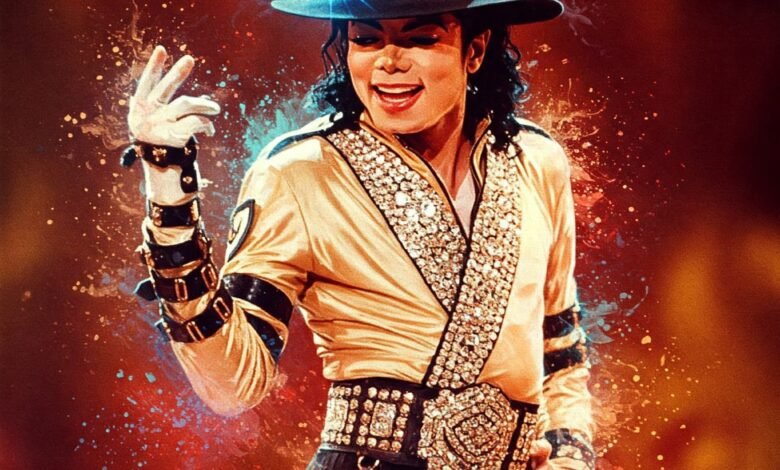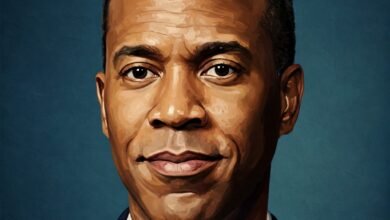The King of Pop: A Comprehensive Exploration of Michael Jackson’s Life and Legacy

Introduction to Michael Jackson
Michael Jackson, often referred to as the “King of Pop,” is widely recognized as one of the most influential figures in the history of music. His remarkable career spanned over four decades, during which he not only transformed the music industry but also set new standards for performance and artistic expression. Emerging as a child prodigy with the Jackson 5, Michael’s early success was just the beginning of a storied trajectory that would change the landscape of popular music.
Throughout his career, Jackson was a pioneer in blending various genres, including pop, rock, R&B, and dance music. His groundbreaking albums such as “Thriller,” “Bad,” and “Dangerous” produced timeless hits and continue to resonate with audiences across generations. “Thriller,” in particular, remains the best-selling album of all time and features iconic tracks that exemplify Jackson’s unique sound and artistry.
In addition to his musical achievements, Michael Jackson was known for his distinctive style, which included the famous moonwalk dance move and a signature fashion sense characterized by sequined gloves and military-inspired jackets. His innovative approach to music videos transformed them into a vital component of the artistic presentation, with iconic productions like “Thriller,” “Billie Jean,” and “Beat It” setting new benchmarks in visual storytelling.
Jackson’s influence extended beyond music; he became a global cultural icon, advocating for social issues and humanitarian causes. His ability to connect with fans transcended geographical and cultural barriers, making him a household name around the world. This introduction serves to lay the foundation for an in-depth exploration of Michael Jackson’s illustrious life, artistic journey, and enduring legacy in the realm of entertainment.
Early Life and Influences
Michael Jackson was born on August 29, 1958, in Gary, Indiana, as the eighth of ten children in the Jackson family. His upbringing played a vital role in shaping his musical career and artistic expression. The Jackson household was marked by a blend of love, discipline, and ambition, largely influenced by Joseph Jackson, the patriarch, who played a crucial role in molding the family’s musical journey. Joseph’s unyielding dedication to his children’s success, often characterized by strict training regimens, was instrumental in the formation of the Jackson 5, the family’s iconic Motown group. This environment fostered not only a dedication to music but also an understanding of the rigors of the entertainment industry.
From a young age, Michael displayed a profound affinity for music. His initial exposure to rhythm and melody came through family gatherings, where the Jackson children were encouraged to sing and perform. The Jackson 5, formed in the mid-1960s, provided him with a platform that honed his talents. Michael’s passion for performance flourished as he took center stage, showcasing his remarkable vocal ability paired with charismatic dance moves. The early years with the Jackson 5 were formative, allowing Michael to experiment with his artistry and establish his identity as a performer.
Furthermore, external influences played a significant role in shaping his musical inclinations. Artists such as James Brown, the Temptations, and Jackie Wilson prominently influenced his performance style, while the social changes of the 1960s imbued his artistry with depth and relevance. Jackson’s early life experiences and the musical influences surrounding him laid the foundational stones for his illustrious career. His journey was marked by a combination of familial support, a burgeoning love for music, and an ambition that would eventually lead him on the path to becoming the King of Pop.
Rise to Fame with the Jackson 5
The Jackson 5, consisting of siblings Jackie, Tito, Jermaine, Marlon, and Michael, emerged as one of the most celebrated Motown acts of the late 1960s and early 1970s. Their rise to fame was marked by their extraordinary talent, captivating stage presence, and a series of memorable hits that defined a generation. The group’s debut single, “I Want You Back,” released in 1969, not only topped the charts but also showcased Michael’s prodigious vocals at a young age. This song laid the foundation for their subsequent successes, rapidly paving the way for the Jackson 5 to become a sensation.
With an energetic blend of soul, pop, and R&B, their dynamic performances quickly garnered attention. The Jackson 5’s dance routines, characterized by synchronized moves and infectious energy, set them apart from other acts of the time, captivating audiences across the globe. Songs like “ABC,” “The Love You Save,” and “I’ll Be There” followed, each achieving commercial success and solidifying the group’s place in music history. Michael’s naturally charismatic presence on stage often drew the spotlight, leading to his position as the standout performer within the ensemble. These early performances provided a glimpse of the artistry that would later define Michael Jackson’s solo career.
However, the journey was not without challenges. As child stars, the Jackson 5 faced intense pressure from the music industry and the public. The transition from child artists to adulthood introduced a set of struggles, including issues of personal identity and the desire for artistic autonomy. Despite these challenges, Michael remained a pivotal figure in the group, leaving an indelible mark on their sound and image. His evolution as an artist began during this period, setting the stage for his later solo career and the remarkable legacy he would ultimately create.
The Solo Career Breakthrough
Michael Jackson’s transition from a member of the Jackson 5 to a solo artist marked a significant turning point in the music industry, showcasing his extraordinary talent and versatility. This transformation began in earnest with the release of his album ‘Off the Wall’ in 1979. The record highlighted Jackson’s unique ability to blend disco, pop, and soul, resulting in a sound that was both innovative and immensely appealing. Produced by Quincy Jones, ‘Off the Wall’ included memorable hits such as “Don’t Stop ‘Til You Get Enough” and “Rock with You,” which helped establish Jackson as a formidable solo artist.
However, it was the release of ‘Thriller’ in 1982 that catapulted Michael Jackson to global superstardom. This album not only broke records but redefined the very essence of pop music. Featuring groundbreaking tracks like “Billie Jean,” “Beat It,” and the iconic title track “Thriller,” the album showcased Jackson’s ability to narrate compelling stories through music coupled with striking visuals, particularly evident in the legendary music videos that accompanied these songs. The production techniques utilized in ‘Thriller’ were revolutionary; combining elements of rock, funk, and pop, Jackson created a sound that resonated across diverse audiences.
Moreover, Jackson’s collaborations with top producers and songwriters played an essential role in his artistic evolution. His teamwork with Quincy Jones resulted in a creative partnership that elevated both their careers, leading to ‘Thriller’ becoming the best-selling album of all time. The innovative techniques employed during this era also included intricate dance routines and elaborate stage productions, which further solidified Michael as a multi-talented performer.
Overall, Jackson’s solo career not only redefined his own trajectory but also had a lasting impact on the music industry, setting new standards for artistry and commercial success.
Innovative Music Videos and Live Performances
Michael Jackson is widely recognized for his transformative contributions to the music video format, elevating it from a simple promotional tool to a powerful art form. Through innovative storytelling, cutting-edge special effects, and memorable choreography, Jackson redefined what audiences could expect from music videos. His iconic works, such as ‘Billie Jean,’ ‘Beat It,’ and ‘Scream,’ showcased not only his extraordinary musical talent but also his ability to merge music with visual spectacles. ‘Billie Jean’ is particularly notable for its groundbreaking use of dance and lighting, captivating viewers with its seamless blend of narrative and choreography. The signature moonwalk dance move introduced in this video became emblematic of Jackson’s influence on popular culture.
Furthermore, the video for ‘Beat It’ revolutionized the portrayal of conflict and resolution, incorporating elements of street dance and featuring a memorable showdown between rival gangs. This music video set a precedent for integrating social themes and visually stunning sequences into the medium, contributing to a more profound engagement with the audience. Additionally, ‘Scream,’ a collaboration with his sister Janet Jackson, exemplified his commitment to pushing creative boundaries, featuring elaborate sets and confrontational themes that resonated with the public.
Beyond the realm of music videos, Michael Jackson’s live performances are legendary for their theatricality and meticulous choreography. His concerts transformed the concert-going experience, incorporating elaborate stage designs, sophisticated lighting systems, and intricate dance routines that captivated audiences worldwide. Jackson’s ability to engage with fans, combined with his mastery of stage presence, created unforgettable moments in live entertainment. This innovative approach not only set new standards in the music industry but also paved the way for future artists. His contributions continue to inspire musicians and performers, underscoring his status as a pioneering force in music and entertainment.
Personal Struggles and Controversies
Michael Jackson’s illustrious career was often overshadowed by personal struggles and controversies that significantly shaped his life narrative. As the preeminent figure in pop music, he was perpetually in the spotlight, which had profound effects on his mental health. The pressures of fame were relentless; Jackson faced an immense public scrutiny that influenced not only his professional journey but also his personal well-being. This constant media attention often delved into the most intimate aspects of his life, creating a complex relationship between the artist and the public. The image projected by the media frequently contradicted Jackson’s own experiences, leading to a distorted view of his persona.
Additionally, Jackson’s mental health challenges have been a subject of concern. Reports indicated that he battled anxiety and underwent various periods of depression, fueled in part by the pressures of maintaining his status as the “King of Pop.” As he accumulated awards and accolades, the expectations placed upon him escalated, leaving him wrestling with his identity beyond his music. The emotional toll was evident in his limited public appearances in his later years, wherein Jackson’s struggles became increasingly apparent.
Legal battles also marred his reputation. Jackson faced multiple accusations throughout his career, including highly publicized child molestation allegations that culminated in a trial in 2005. Although he was acquitted, these controversies left a lasting impact on his legacy and public perception. The intricacies of these events illustrate a man who was not only a groundbreaking artist but who also navigated a tumultuous personal life. While some viewed him as a troubled celebrity, others emphasized the challenges he faced and the profound impacts of media narratives, suggesting a nuanced understanding of his life beyond the glamour of his stellar career.
Philanthropy and Humanitarian Efforts
Michael Jackson, widely recognized as the King of Pop, not only made an indelible mark on the music industry but also committed a significant portion of his life to philanthropy and humanitarian efforts. His dedication to charitable causes showed a deep-seated belief in the power of music and celebrity status to drive positive change. Jackson actively participated in numerous humanitarian initiatives, advocating for children’s rights, health, and poverty alleviation.
Throughout his career, Jackson supported over 39 philanthropic organizations, reflecting his commitment to social justice and humanitarianism. A notable example of his contributions is his involvement with organizations such as USA for Africa during the 1980s. He co-wrote the classic anthem “We Are the World,” which raised millions for famine relief in Africa. This landmark project not only showcased his talent but also his drive to address global issues and extend aid to the underprivileged.
Moreover, Jackson’s unwavering support for children was evident in his contributions to organizations like the Make-A-Wish Foundation and the Children’s Defense Fund. His dedication extended beyond mere donations; he participated in various events that aimed to uplift and empower youth facing adversity. His visits to children’s hospitals and orphanages made a profound impact, providing not only financial assistance but also emotional support to those in need.
In addition to these efforts, Michael Jackson established his charitable foundation, the Heal the World Foundation, aimed at improving the lives of children globally. The organization focused on providing resources for healthcare, education, and a safe environment, thus embodying Jackson’s vision for a better world. By using his platform to highlight pressing issues, he inspired countless fans and other celebrities to join in advocating for humanitarian causes. His philanthropic legacy remains a poignant aspect of his life, illustrating his enduring commitment to making a positive difference in the world.
Legacy and Influence on Music and Culture
Michael Jackson, often hailed as the King of Pop, leaves behind an indelible legacy that has continually influenced contemporary music and culture. His innovative approach to music, characterized by groundbreaking sounds and compelling narratives, reshaped the landscape of popular music. Jackson’s unique ability to blend genres such as pop, rock, and R&B not only captivated millions but also set new standards for musical artistry. His albums, particularly “Thriller,” “Bad,” and “Dangerous,” remain milestones that resonate with both fans and musicians alike.
Beyond music, Jackson’s influence permeates various aspects of culture, particularly in dance and fashion. His signature dance moves, most notably the moonwalk, became synonymous with his identity and were widely adopted by new generations of performers. This innovative choreography contributed to a surge in interest in dance as an art form within the music industry, inspiring artists from diverse genres to incorporate dance into their performances. Furthermore, Jackson’s distinctive style, characterized by flashy attire and iconic accessories, set trends in fashion that are still emulated today.
Jackson’s impact extends into the realm of music videos, where he transformed the medium into an art form. His visually stunning and narratively rich music videos, such as “Thriller” and “Beat It,” set a precedent for storytelling in video production and helped establish the importance of visual identity in an artist’s brand. This integration of high production values in music videos has influenced countless artists across the globe, leading to a standard that prioritizes creativity and presentation.
Moreover, Michael Jackson’s philanthropic efforts and advocacy for various social issues also contributed significantly to his legacy. His commitment to humanitarian causes not only highlighted his character but also inspired others in the entertainment industry to leverage their fame for social good. As an iconic figure within global culture, Michael Jackson’s enduring legacy continues to inspire and influence artists and fans around the world, ensuring that his presence remains felt for generations to come.
Conclusion: Remembering the King of Pop
Michael Jackson, widely acknowledged as the King of Pop, remains an iconic figure whose influence continues to resonate across generations and borders. His contributions to music, dance, and popular culture are unparalleled, characterized by groundbreaking albums, unforgettable performances, and innovative music videos that transformed the entertainment landscape. From “Thriller” to “Billie Jean,” Jackson’s discography not only explored profound themes but also pushed creative boundaries, setting new standards within the industry.
Beyond his musical achievements, Jackson’s persona was complex, woven with brilliance and controversy. While he was celebrated for his artistry and philanthropy, his life was also marked by personal challenges, legal battles, and intense media scrutiny. This duality has sparked discussions about the pressures faced by public figures and underscores the need for a nuanced understanding of celebrity culture. It serves as a reminder that behind the immaculate stage performances and record-breaking hits lay a human being with vulnerabilities and triumphs.
Even after his passing, Michael Jackson continues to inspire countless artists, producers, and fans worldwide. His signature style, innovative choreography, and emotive singing have influenced a multitude of genres and continue to shape the music industry today. Artists across various platforms—from pop to hip-hop—frequently reference his work and aesthetic, ensuring that his legacy will endure. As we reflect on his life, it becomes evident that Michael Jackson was not merely a performer; he was a cultural phenomenon whose impact remains deeply entrenched in the fabric of modern music and entertainment.






















